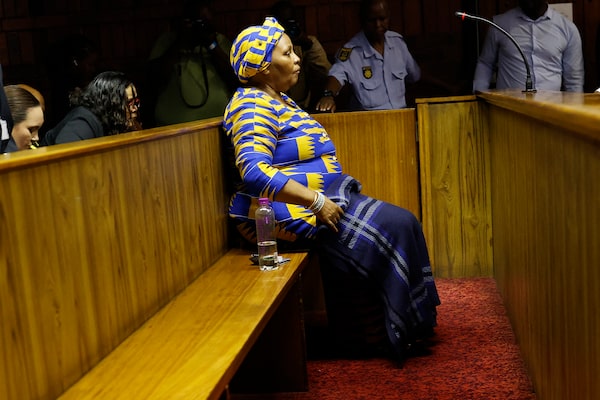
Former defence minister and Speaker of South Africa’s National Assembly, Nosiviwe Mapisa-Nqakula, sits in the dock for her court appearance at the Pretoria Magistrate Court on April 4, 2024.PHILL MAGAKOE/Getty Images
A former South African defence minister is facing charges of corruption and money laundering, with prosecutors alleging she took more than $150,000 in cash bribes from a defence contractor.
Nosiviwe Mapisa-Nqakula, a cabinet minister for 17 years, is one of the most senior South African officials ever to be charged with corruption. Until her resignation this week, she had been the speaker of Parliament, making her the head of South Africa’s legislature and fourth in line to the presidency.
South African television channels showed video of her leaving her Johannesburg mansion in a convoy of luxury cars on Thursday morning. She turned herself in to police and later appeared in court, where prosecutors read the charges against her. She was released on bail of about $3,600 after surrendering her passport.
The charges will cast a spotlight on her party, the long-ruling African National Congress, and its failure to stem a tide of corruption allegations over the past 15 years. With a national election approaching next month, polls suggest the ANC could fall to its worst-ever performance, forcing it to seek coalition partners for the first time since it won office in 1994, after apartheid ended.
The Globe in South Africa: 30 years after apartheid, South Africans battle against more dark times
The ANC has repeatedly pledged to fight corruption in its ranks and force any graft-implicated members to step down from official posts. But its list of parliamentary candidates in the May 29 election includes a number of members who faced serious corruption accusations at a recent public inquiry, often with extensive evidence against them.
Ms. Mapisa-Nqakula, 67, was a senior ANC official for two decades, serving on the party’s national executive committee and also heading the ANC women’s league. She was South Africa’s defence minister for nine years.
In the alleged bribery case, she is facing 12 charges of corruption and one charge of money laundering. Prosecutors say she took a dozen cash payments – and a wig – from a defence contractor who had received millions of dollars in business from South Africa’s army. If convicted, she could be jailed for up to 15 years.
The kickbacks were allegedly made between 2016 and 2019, when she was defence minister. Prosecutors say she also solicited a further $145,000 in bribes but the money was not paid.
Officials of the national prosecuting agency raided her home last month as part of their investigation, reportedly seizing a wig and receipts for home renovations that had been paid in cash.
In a highly unusual move, Ms. Mapisa-Nqakula went to court last month to seek an order that would block her arrest. She argued that her “freedom and dignity” were threatened by officials who were subjecting her to the “humiliation of publicity and public speculation.” But a judge rejected her application this week.
Her attempt to block her arrest seemed to be premised “on the false assumption that she is entitled to special treatment and that it would be outrageous to arrest her because she is a senior ANC leader and (as an afterthought) also the Speaker,” South African law professor Pierre de Vos said in a published commentary on the case.
President Cyril Ramaphosa, in his state-of-the-nation speech in February, repeated his longstanding vow to fight graft. “We will not stop until every person responsible for corruption is held to account,” he said. “We will not stop until corruption is history.”
But analysts have noted that Ms. Mapisa-Nqakula is one of only a small handful of ANC officials to face corruption charges, despite mounds of evidence in media reports and from the public inquiry that operated from 2018 to 2022. The inquiry heard from more than 300 witnesses, gathered 1.7 million pages of documentary evidence, implicated dozens of officials and produced a six-volume report of more than 5,400 pages. Nobody has been formally charged as a result of the report’s findings.
Former president Jacob Zuma, who was forced to resign under a cloud of corruption allegations in 2018, has used a vast arsenal of legal tactics to delay his criminal trial.
Prosecutors say Mr. Zuma received 783 payments that amounted to bribery and corruption. Businessman Schabir Shaik was sentenced to prison in 2005 on charges of paying bribes to Mr. Zuma during a multibillion-dollar weapons purchase by the South African government when Mr. Zuma was deputy president.
In its recently released election manifesto, the ANC acknowledges that voters see it as “soft on corruption.” The manifesto says: “We admit we made mistakes as the ANC, with some members and leaders undermining institutions of the democratic state and advancing selfish personal interests.”